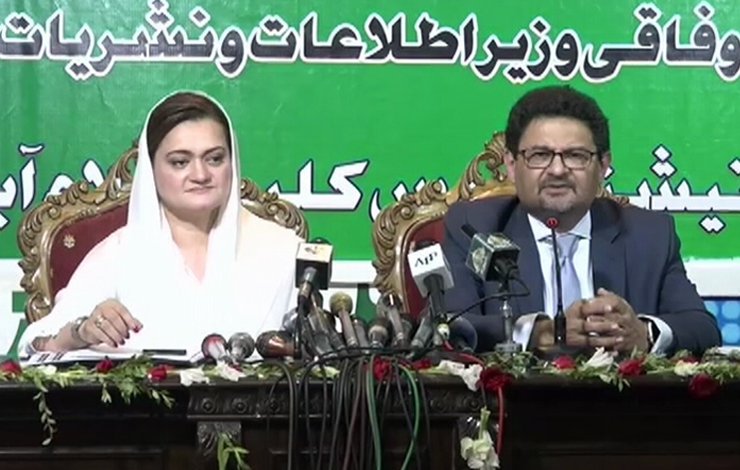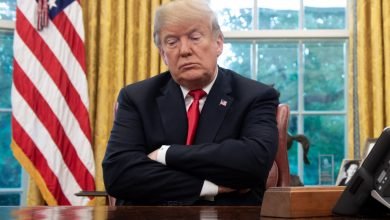Before IMF talks, Miftah Ismail hints at ending PTI’s financial relief package
Miftah Ismail hinted at reserving the PTI financial relief package prior to departing for Washington to hold renegotiation with IMF.

ISLAMABAD: The newly-appointed Finance Minister Miftah Ismail has hinted at reserving the Pakistan Tehreek-e-Insaf (PTI) financial relief package prior to departing for Washington to hold renegotiation with the International Monetary Fund (IMF).
The newly appointed Finance Minister Miftah Ismail departed for Washington on Wednesday seeking the revival of the $6 billion International Monetary Fund (IMF) programme signed by the PTI government.
While addressing a press yesterday, Miftah Ismail said that IMF will be sought to revive the loan programme and lessen the financial burden on the nation.
He said that the IMF is not accepting the subsidy on petrol and electricity.
The new government is looking for an appropriate time to take a U-turn on the financial relief package announced by former prime minister Imran Khan on February 28. The finance minister signalled that the government could no longer adhere to the decision to subsidise Rs5 per unit on electricity and Rs22 on petrol and Rs52 on diesel.
Miftah departed for Washington after the removal of his name from the Exit Control List (ECL). During his visit, the finance minister will meet IMF officials to apprise them regarding the economic situation.
He alleged that former prime minister Imran Khan and his cabinet had decided to reduce the electricity tariff by Rs5 per unit for electricity consumers from 200 units to 700 units without informing the finance ministry.
He added that the past ruler had also decided for continuing the reduction till June 30, 2022. Approximately Rs126 billion was allocated for the purpose but it was neither approved by the Economic Coordination Committee (ECC) nor the allocation.
The previous cabinet had also decided to maintain the prices of petroleum products till June 30, 2022, without the consent of the finance ministry and provide a subsidy of Rs10 on petrol and diesel. A subsidy of Rs130 billion was allocated and the reduction of petroleum levy was suspended besides reducing the general sales tax. The move paved the way for Rs95 billion tax subsidy.
He said that the IMF delegation did not take a strong stance on the issue of electricity. He said that the country will face an additional budget deficit worth over Rs1,800 billion if the government keeps the prices of petroleum products frozen till June 30. A subsidy of Rs67 billion has been allocated for the month of April and Rs96 billion for May, whereas, an additional subsidy of Rs 96 billion will have to be paid for June and June.
“If we maintain the subsidy on diesel, we will have to pay a subsidy of Rs51.52 per litre but the inflation will significantly rise after ending the subsidy as it will hike the transportation charges of essential commodities.”
Before making a decision regarding the huge expenditures, the national exchequer was not reviewed. The balance of income and expenditure was Rs2500 billion this year which soared to Rs1,300 billion, increasing the risk of hiking the budget deficit from Rs3400 billion to Rs5600 billion. The expected budget deficit was termed as the biggest concern of IMF to resume the loan program.
He said that the IMF wanted an immediate refund of Rs150 billion corporate tax exemption but we have asked to postpone the matter till the budget. The government also rejected the demand to go for a mini-budget as it is the favour of fulfilling the IMF’s demands in phases.
“We will try to complete the seventh review of the economy as soon as possible, get a new tranche of a $1 billion loan from the fund and then consult with them to prepare the budget and complete the eighth review of the economy,” he said.
He said that various proposals for the budget have come from the private sector including the tax on the hereditary distribution of property, restoration of wealth tax, imposition of environment tax and imposition of fines on those who harm the environment.
Responding to a question about the depreciation of the Pakistani rupee against the US dollar, he said that when Mian Shahbaz Sharif was elected Prime Minister, the value of the rupee was increased by Rs6 to Rs8.
The Finance Minister compared the performance of himself and the PTI government and said that in our time foreign debt was $75 billion which has increased to $108 billion in four years. Domestic debt has increased from Rs2400 billion to Rs 4300 billion. In our time the budget deficit was Rs1600 billion which will go up to Rs. 5600 billion this year. The current account deficit was $16 billion which will exceed $20 billion this year.
Dr Muftah Ismail has now left for the United States to attend the World Bank’s spring meeting, as well as meet with the IMF officials and brief them on his government’s priorities. He will also seek the resumption of the IMF loan program without imposing stricter conditions.



